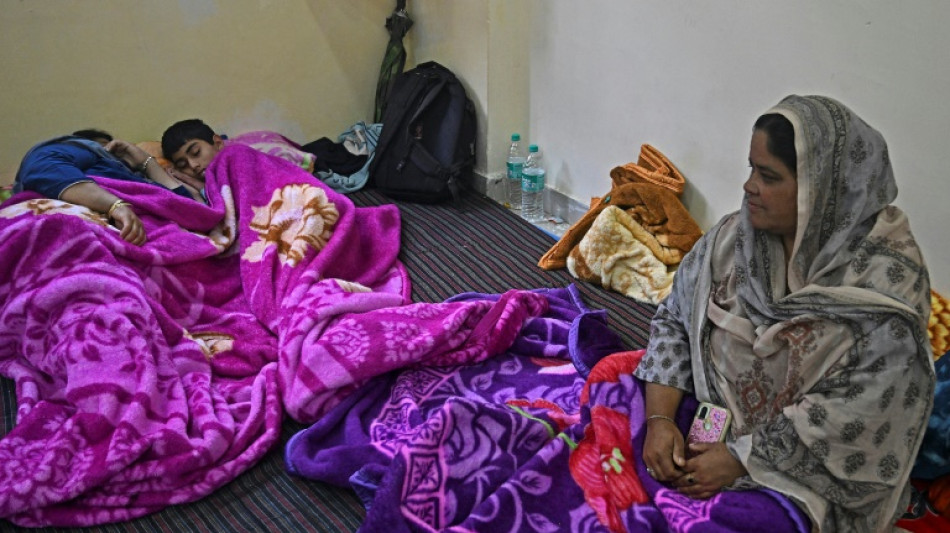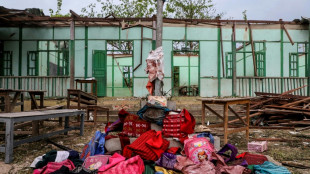
| RBGPF | 3.48% | 65.27 | $ | |
| RYCEF | -1.35% | 10.36 | $ | |
| CMSC | 0.41% | 22.15 | $ | |
| AZN | 1.91% | 68.885 | $ | |
| BP | 1.24% | 30.145 | $ | |
| SCS | 4.04% | 10.9 | $ | |
| BTI | -2.09% | 40.786 | $ | |
| RIO | 2.36% | 61.43 | $ | |
| GSK | 2.2% | 37.445 | $ | |
| NGG | -4.19% | 67.85 | $ | |
| JRI | -0.15% | 12.96 | $ | |
| CMSD | 0.18% | 22.381 | $ | |
| VOD | -2.25% | 9.095 | $ | |
| RELX | -4.14% | 51.71 | $ | |
| BCE | -0.71% | 22.55 | $ | |
| BCC | 4.76% | 93.05 | $ |

Indian teams defuse bombs in Kashmir border areas
Expert teams on Monday defused unexploded bombs in India's border areas with Pakistan before letting displaced Kashmiri villagers return home following a ceasefire between the nuclear-armed foes.
Tens of thousands of people living on the Indian side of the divided Himalayan territory fled last week to escape intense artillery bombardment that reduced many homes to rubble.
A truce announced Saturday ended four days of missile, drone and artillery attacks which killed dozens in India and Pakistan and was their worst conflict since 1999.
Police had issued written statements warning people "NOT to under any circumstances approach, touch, tamper with, or attempt to move any suspicious object resembling an explosive shell or device."
Bomb disposal squads fanned out in Uri, near the de facto border with Pakistan, to ensure homes were completely safe before the inhabitants returned.
"We started at homes where people had reported unexploded ordinance," senior police officer Gurinderpal Singh told AFP.
Singh declined to specify how many teams had been dispatched or where.
- Delicate task -
"Every piece of ordinance is unique and needs to be handled very carefully," Singh said, adding that displaced villagers were only being allowed back into "areas that have been cleared."
Hundreds of border residents sheltering in government buildings were anxious to go home, waiting for authorities to declare their villages safe.
"We were happy that a ceasefire happened and wanted to go home right away," Mohammad Shafiq, a resident of Mohra village told AFP at a shelter around 30 kilometres (20 miles) from his house.
His family of five was evacuated by the army after a bomb exploded in their village last week.
"But officers told us not to return until any unexploded mortar shells were removed," said the 47-year-old.
Mareena, a 28-year-old mother of three, said she let her sheep out into the open before an army truck evacuated them to the shelter at Boniyar, around 50 kilometres from her border home.
- 'I want to go back' -
"I don't know what has happened to my house," Mareena said. "I want to go back but I am not confident yet. Anything can happen -- we saved our lives with great difficulty."
Even those whose houses were destroyed by artillery shells were desperate to return.
Basharat Hussain, 35, packed his family of nine in a car to make the journey home.
"We want to go and see what can be salvaged and rebuilt," Hussain told AFP as he waited near an army checkpoint, pleading with soldiers to let them go ahead.
"We also have to look for our cows and other belongings," he said, showing a video of his damaged home sent to his phone.
Local reports said six of around 35 bombed villages in Uri were declared safe on Monday for residents to return.
Videos showed authorities taking some displaced families from a shelter in buses back to their villages.
Muslim-majority Kashmir has been divided between India and Pakistan since their independence from British rule in 1947.
They have since fought three wars over the disputed and divided territory they administer in parts.
The latest fighting threatened to spiral towards all-out conflict before dawn on Wednesday, when India launched missile attacks destroying what it called "terrorist camps" in Pakistan and part of Kashmir Islamabad controls.
The fighting followed an April 22 attack on tourists in Indian-controlled Kashmir, which killed 26 civilians.
India accused Pakistan of backing the attack but Islamabad denied involvement and immediately responded to the strikes with heavy artillery fire, fanning the latest conflict.
Militants opposed to Indian rule in Kashmir have stepped up attacks on security forces since 2019, when Indian Prime Minister Narendra Modi's Hindu nationalist government revoked the region's limited autonomy and imposed direct rule from New Delhi.
Ch.Buidheach--NG


